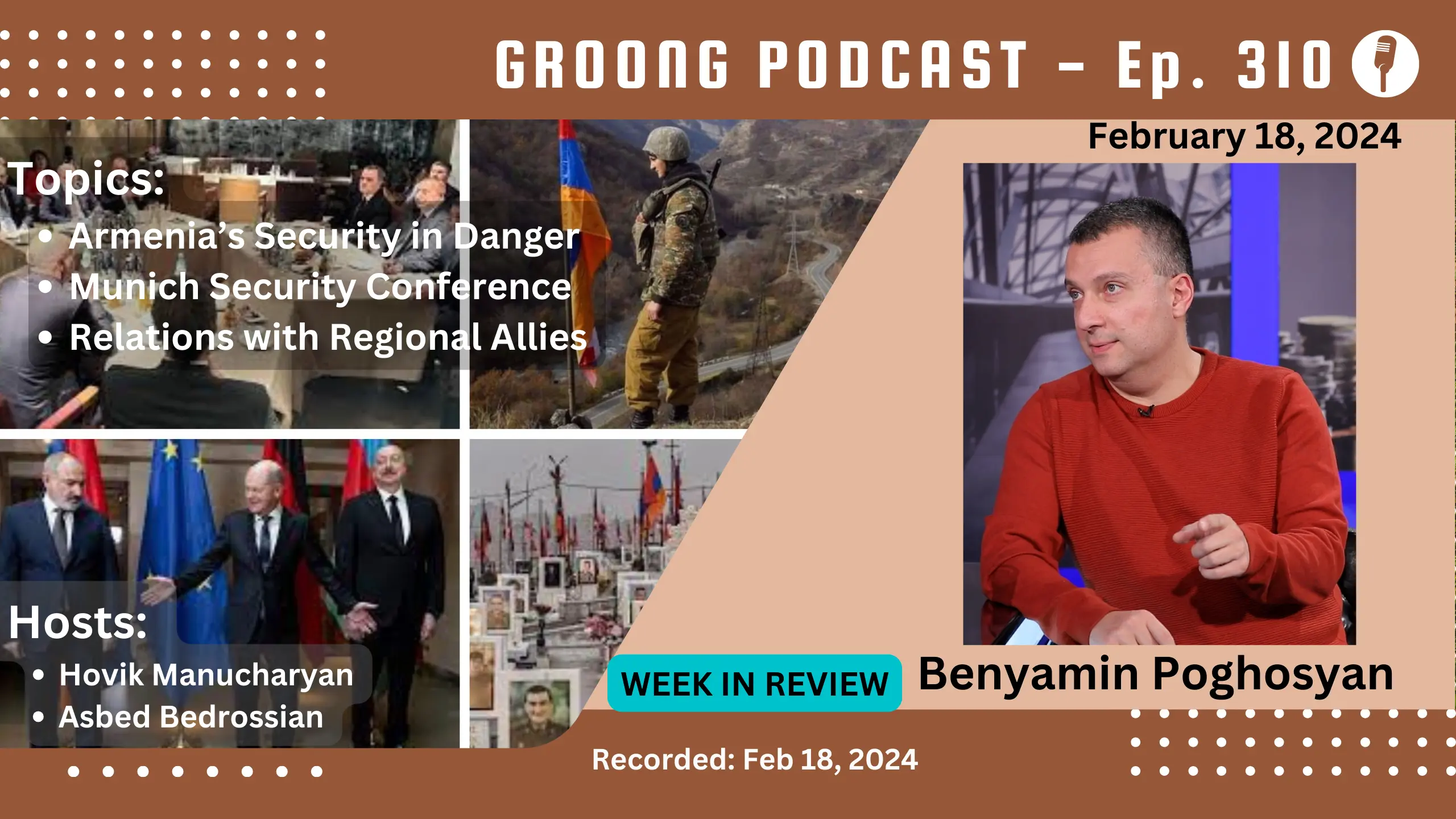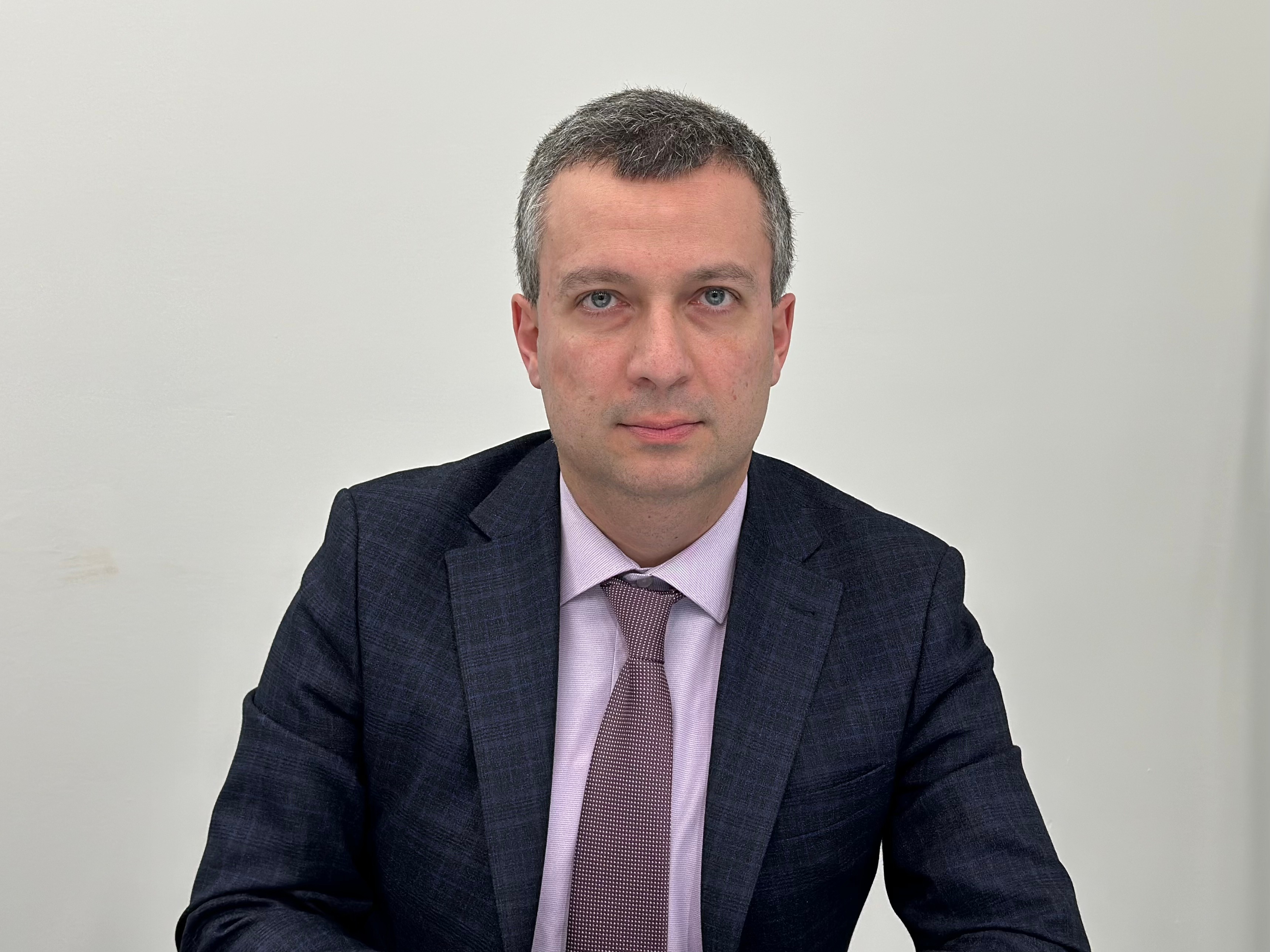
Groong Links:
Guest:
Topics:
- Armenia’s Security in Danger
- Munich Security Conference
- Relations with Regional Allies
Episode 310 | Recorded: February 18, 2024
Show Notes
Armenia’s Security in Danger
Earlier this week 4 of our soldiers were shot dead on the border near Nerkin Hand, when Azerbaijan opened fire alleging that they were retaliating against Armenians firing at them the previous day. When Azerbaijan made the allegation, Pashinyan and Suren Papikyan responded that they would investigate the possible violation of their rules that Armenian soldiers will not fire on Azerbaijan, and if true, they would prosecute the soldiers. Later they claimed that Azerbaijan made false claims, but serious damage was already done to Armenia’s credibility. Even EU foreign policy head Borrell gave Azerbaijan a huge boost by accepting the unproven allegation that Armenians had shot at Azerbaijanis the day before and labeling the incident as “deplorable”, before saying that he thinks Azerbaijan’s bloody murder of 4 Armenians seems to be a “disproportionate response”.
While this happened in Armenia, Mirzoyan was in Luxemburg, and now he and Pashinyan and Papikyan are in Munich for the annual Munich Security Conference. Alen Simonyan, meanwhile, was on an official visit to Bulgaria.
And we’re not even going to have time to address the domestic drama of ministers and deputy ministers being fired and jailed, or under house arrest; and opposition leaders held as political prisoners.
Questions:
- How high is the potential for war since Aliyev’s so-called “re-election” as president on February 7?
- What is the country’s leadership doing around Europe, when the security situation in Armenia is, even according to Pashinyan himself, at a critical juncture?
Munich Security Conference
In Munich, Pashinyan met with secretary of state Anthony Blinken, MI-6 chief Richard Moore, the president of Iraqi Kurdistan, and others. He also met with Aliyev in a trilateral format with German chancellor Olaf Scholtz. Allegedly Azerbaijan has pledged to resolve differences without new violence.
Meanwhile, former president Serge Sargsyan warned that Pashinyan is agreeing to new concessions.
Questions:
- How should we interpret what we’re reading about the outcomes from this conference?
- What are the topics of discussion between Pashinyan and Richard Moore? He keeps meeting with US and UK spy chiefs. Are they, as rumors suggest, overseeing the creation of Armenia’s new foreign intelligence service?
- One of Pashinyan’s meetings was with the prime minister of Kosovo, during the meeting he referred to his counterpart with the official title “Prime Minister of Kosovo”. Do you think that Armenia may recognize Kosovo’s independence soon? What potential benefits and drawbacks could such a move have?
Relations with Regional Allies
Two countries who were not in Munich: Russia and Iran, both of them vital neighbors and allies of Armenia, and both of them have been sounding major alarms of disapproval about Armenia’s current foreign policy direction. Frankly, I don’t think Armenia would exist today if it weren’t for Iran baring its teeth in defending its adjacency to Armenia as its own national security interest.
Relations with Russia
Russia’s invitations for Armenia to negotiate in Moscow have fallen on deaf ears in Yerevan, while Aliyev has shown no interest in continuing negotiations mediated by the West; at least the US and France. After this week’s Azeri shootings, Russia again asked both sides to show restraint, but it also warned Armenia that there are grave dangers awaiting it.
Questions:
- Were Serdyukov’s warnings about war on Armenia concerns, or a threat?
- It certainly set off a public discussion between a couple of Armenian and Russian parliamentarians.
- Pashinyan says that Armenia is only diversifying its security relations, not turning its back on Russia, as the latter claims. How do you assess this realignment, or diversification, or whatever this process is?
Armenia in the ICC
Pashinyan’s interview to the Telegraph on February 11, was as usual, full of potentially dangerous revelations. Pashinyan again confirmed that Armenia doesn’t view membership in CSTO (or any other international security alliance) to be in Armenia’s strategic interests. This appears to be in line with ideas spread by others, such as Armen Grigoryan of the National Security Council, who say that Armenia should pursue a policy of neutrality.
During that same interview, Pashinyan was repeatedly asked if Armenia would arrest Putin, since Armenia is now a member of the ICC. Pashinyan doggedly refused a straight response, instead saying that he can’t interfere with Armenia’s judicial & law enforcement systems. This is from a guy who was recorded giving instructions to his National Security Service director to arrest his political opponents.
Another Armenian official, Yeghishe Kirakosyan, who represents Armenia on the international legal stage admitted that some interpretations of international law could indicate that Armenia must arrest Putin if the latter sets foot on Armenian soil. Russians have warned many times that joining the ICC was an unfriendly act and Peskov reiterated those claims this week.
Questions:
- Isn’t “guaranteed neutrality” what Azerbaijan and Turkey are demanding from Armenia? How can this stance be seen in-line with Armenia’s strategy?
- Armenia’s relationship with Russia has been damaged significantly. How will membership in the ICC compensate for this?
Relations with Iran
Iran has been very clear and vocal in its redlines. Iran has warned Azerbaijan and Turkey that it will not tolerate any border or sovereignty changes to Armenia. They’ve also warned Armenia that non-Regional actors are not welcome. Specifically the EUMA is a cause for concern to them.
Question:
- How are Armenia’s relations with Iran evolving since the Azeri ethnic cleansing of Artsakh in September 2023?
Russia, Artsakh, and Azerbaijan
Since Armenia dumped Artsakh and degraded its relations with Russia, Russia has realigned its strategy in the South Caucasus to have a tighter partnership with Azerbaijan. Russia is talking with Azerbaijan to arrange a right of return for Armenians of Artsakh back to their land.
Question:
- Is this a realistic dialog, or just a self-serving effort to keep Russian forces in Artsakh?
Topics from the Panelists
- Benyamin: Hoping that Armenian decision makers stop making strategic blunders
- Hovik: Kerobyan’s arrest and Pashinyan’s fake fight against corruption
Wrap-up
That’s our Week in Review, we hope you found it helpful. We invite your feedback and your suggestions, you can find us on most social media and podcast platforms. Thanks to Laura Osborn for the music on our podcasts.
Guests

Benyamin Poghosyan
Dr. Benyamin Poghosyan is a Senior Research Fellow at APRI Armenia, a Yerevan based think tank,and the Chairman of the Center for Political and Economic Strategic Studies. He has served as the vice president for research and head of the Institute for National Strategic Studies at the National Defense Research University in Armenia. Dr. Poghosyan was a Distinguished Research Fellow at the US National Defense University College of International Security Affairs. He is a graduate from the US State Department Study of the US Institutes for Scholars 2012 Program on US National Security Policy Making. He holds a PhD in history and is a graduate from the 2006 Tavitian Program on International Relations at Fletcher School of Law and Diplomacy.
Hosts

Asbed Bedrossian
Asbed Bedrossian is an IT professional, and for years oversaw the central IT enterprise infrastructure and services at USC. His decades of experience spanned across IT strategy, enterprise architecture, infrastructure, cybersecurity, enterprise applications, data center operations, high performance computing, ITSM, ITPM, and more.
Asbed founded the Armenian News Network Groong circa 1989/1990, and co-founded the ANN/Groong podcast in 2020.

Hovik Manucharyan
Hovik Manucharyan is an information security engineer who moved from Seattle to Armenia in 2022. He co-founded the ANN/Groong podcast in 2020 and has been a contributor to Groong News since the late 1990s.
Disclaimer: The views expressed by Hovik Manucharyan on the ANN/Groong podcast are his own and do not necessarily reflect the opinions of his employer or any other organization.